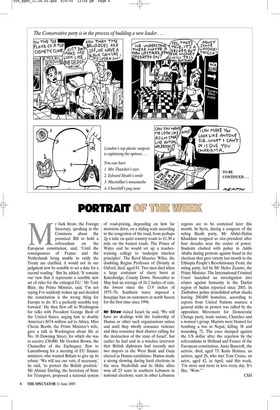PORTRAIT OF THE WEEK M r Jack Straw, the Foreign Secretary,
speaking in the Commons about the promised Bill to hold a referendum on the European constitution, said, ŌĆśUntil the consequences of France and the Netherlands being unable to ratify the Treaty are clarified, it would not in our judgment now be sensible to set a date for a second reading.ŌĆÖ But he added, ŌĆśIt remains our view that it represents a sensible new set of rules for the enlarged EU.ŌĆÖ Mr Tony Blair, the Prime Minister, said, ŌĆśIŌĆÖm not saying IŌĆÖve suddenly woken up and decided the constitution is the wrong thing for Europe to do. ItŌĆÖs a perfectly sensible way forward.ŌĆÖ He then flew off to Washington for talks with President George Bush of the United States, urging him to double AmericaŌĆÖs $674 million aid to Africa. Miss Cherie Booth, the Prime MinisterŌĆÖs wife, gave a talk in Washington about life at No. 10 Downing Street, for which she was to receive ┬Ż30,000. Mr Gordon Brown, the Chancellor of the Exchequer, flew to Luxembourg for a meeting of EU finance ministers, who wanted Britain to give up its rebate: ŌĆśWe will use our veto, if necessary,ŌĆÖ he said, ŌĆśto protect the British position.ŌĆÖ Mr Alistair Darling, the Secretary of State for Transport, proposed a national system of road-pricing, depending on how far motorists drive, on a sliding scale according to the congestion of the road, from perhaps 2p a mile on quiet country roads to ┬Ż1.30 a mile on the busiest roads. The Prince of Wales said he would set up a teachertraining college to ŌĆśunderpin timeless principlesŌĆÖ. The Revd Maurice Wiles, the doubting Regius Professor of Divinity at Oxford, died, aged 81. Two men died when a large container of slurry burst at Katesbridge, County Down. November to May had an average of 16.2 inches of rain, the lowest since the 13.9 inches of 1975ŌĆō76; Southern water imposed a hosepipe ban on customers in north Sussex for the first time since 1996.
Mr Straw visited Israel; he said, ŌĆśWe will have no dealings with the leadership of Hamas or other such organisations unless and until they wholly renounce violence and they renounce their charter calling for the destruction of the state of IsraelŌĆÖ, but earlier he had said in a wireless interview that British diplomats had recently met two mayors in the West Bank and Gaza elected as Hamas candidates. Hamas made a strong showing during local elections in the area. Hezbollah and its Shiite allies won all 23 seats in southern Lebanon in national elections; seats in other Lebanese regions are to be contested later this month. In Syria, during a congress of the ruling Baath party, Mr Abdel-Halim Khaddam resigned as vice-president after four decades near the centre of power. Students clashed with police in Addis Ababa during protests against fraud in the elections that gave victory last month to the Ethiopia PeopleŌĆÖs Revolutionary Front, the ruling party, led by Mr Meles Zenawi, the Prime Minister. The International Criminal Court launched an investigation into crimes against humanity in the Darfur region of Sudan reported since 2003. In Zimbabwe police demolished urban shacks leaving 200,000 homeless, according to reports from United Nations sources; a general strike in protest was called by the opposition Movement for Democratic Change party, trade unions, Churches and a womenŌĆÖs group. Maoists were blamed for bombing a bus in Nepal, killing 38 and wounding 72. The euro slumped against the US dollar after the rejection by the referendums in Holland and France of the European constitution. Anne Bancroft, the actress, died, aged 73. Katie Holmes, an actress, aged 26, who met Tom Cruise, an actor, aged 42, in April, said this week, ŌĆśIŌĆÖm more and more in love every day. ItŌĆÖs like, ŌĆ£Wow.ŌĆØŌĆÖ


















































 Previous page
Previous page